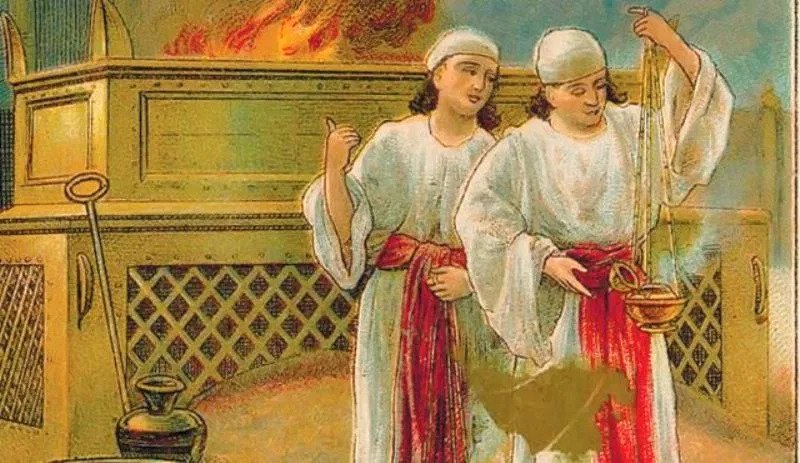Does it really matter how we worship God?
If a man with so much wealth, fame, and acquisition in this world should boast of those things, it can be understandable yet it is nothing compared to the Almighty God who indeed is the creator and owner of everything.
A good number of times in the Bible, especially in the Old Testament, we see how God does not make any reservations to append these words to his command, “I am the LORD.” This is not boasting but rather a constant reminder and emphasis to make mortal men desist from presumptuous worship because the high and holy standards of God demands carefulness in our approach and dealings with Him.
A very good example of such carefulness was sighted a number of times how the priests and the children of Israel did everything “as the Lord commanded Moses”
In this article, we want to learn from the presumptuous act of Nadab and Abihu and also see God’s demand for true worshipers.
The Consecration of Aaron and His Sons
Leviticus 8:1-3,6
And the LORD spake unto Moses, saying, Take Aaron and his sons with him, and the garments, and the anointing oil, and a bullock for the sin offering, and two rams, and a basket of unleavened bread; And gather thou all the congregation together unto the door of the tabernacle of the congregation. And Moses brought Aaron and his sons, and washed them with water.
The ordination of the Priests – Aaron and his sons – was carefully and fully outlined by God. He was specific in his commands as well detailed in the order of service and how the sacrifices should be offered to him. This is because of his perfect and holy nature. He also used physical and tangible things to symbolize his perfection. Take, for instance, the priests’ garments were to be made according to the exact specification. Also, the animals that will be used for sacrifices must be without blemish. This is a clear indication that God demands carefulness and reverence in our worship and expects us to be holy when carrying out divine duties.
The Beginning of the Priestly Ministry
Before the act of Nadab and Abihu, Aaron’s sons in offering a strange fire of incense to God, the previous chapter was a play out of the beginning of the priestly office carried out by Aaron as the Lord commanded Moses. God proved his appointment of Aaron and his sons by a fire that came out and consumed the sacrifices on the altar. This marked the sign of His presence and acceptance of the offering or the person in question.
Today’s post focuses on the shift of paradigm which showed the forbidden act of Nadab and Abihu. Perhaps one may wonder why because what they did seems like what a priest should be doing but the action of these two newly consecrated priests was way beyond that. It was not only an encroachment of duty but a combination of sin contained in one. Before going further on the issue, let’s see the temptation of Christ in Matthew 4:8
Matthew 4:8-10
“Again, the devil taketh him up into an exceeding high mountain, and sheweth him all the kingdoms of the world, and the glory of them; And saith unto him, All these things will I give thee, if thou wilt fall down and worship me. Then saith Jesus unto him, Get thee hence, Satan: for it is written, Thou shalt worship the Lord thy God, and him only shalt thou serve.”
The point here is that the devil made an attempt to destroy the assignment of Christ after forty days of high consecration in the wilderness. This was the same trick he employs on Nadab and Abihu who desiring that front-line of worship set themselves up for destruction.
Clarke Adams commented on this, “Anyone who altered the sacrificial system assumed a prerogative belonging to God alone.”
That is an exclusive right or power to make decisions. Or the ability that gives someone superiority above others. (English Dictionary)
This was the mistake of Nadab and Abihu. They assumed the right to carry out service even though God did not command them. 1 Corinthians 14:40 said that God is a God of order. Think about it, if the whole Israelites, one by one, family after family, begin to make atonement and to burn all those sacrifices, how organized and holy would that be? There will be some sort of carelessness, unprofessionalism (if that can be used), also haphazardness, and no doubt more judgment on the people than the sin they’re trying to put away. To avoid all such things, God decided to consecrate the house of Levi solely for this purpose but this does not give them an equal stand with God.
When Nadab and Abihu took their incense and fire in it shortly after the fire came out from the Lord, they invariably tried to steal the glory that belongs to God alone by putting themselves in the front line. The fire has to come from God to consume the sacrifice as a sign of God’s presence but they lit their own fire and it was counted strange and punished by God.
In his article, Garrett Kell says, “While truth-serving creativity has importance, truth-distorting creativity is a satanic instrument.”
We may have the right intention but our good intention is still sinning if it goes contrary to God’s command.
The concluding verses of Leviticus 9 tell us that as soon as Aaron made an end of making atonement for himself and for the people, he blessed the people. This was the point when the Lord appeared in the temple and consumed the sacrifices by a fire which came out from him and all the people shouted and fell on their faces. They worshipped.
Could it be that at this point Satan tempted Nadab and Abihu?
Can the devil tempt two different people at the same time with the same temptation? He may or may not, but maybe he can do so simultaneously.
From the beginning of creation, God made humans in his image and glory to show forth his praise. We were created to worship God but sin brought a dysfunctional pattern in our worship. Instead of the desire to worship God alone, we also like God, desire to be worshiped one way or the other. This may be subtly or secretly, indirectly or open blanc direct like Satan. (Isaiah 14:12-14)
Who knows, perhaps when the people fell on their faces and worshipped after the fire came out from the Lord, the devil tricked Nadab and Abihu into believing that they too can have such worship from the people soon. And no sooner than they were ordained for the priestly office were they destroyed by God himself!
The Act of Presumptuous Worship
One of the prayers of the Psalmist was that God should deliver him from the presumptuous sin. This is a sin really feared by David and should be avoided by every true follower of Christ because God does not lower his standard for any man. He said in Leviticus 10:3 “I will be sanctified in them that come nigh me, and before all the people I will be glorified…”
We are forbidden to play the role of God when he has not commanded us. Aaron was grieved for his two sons but he understood God’s holy standard.
The Devil’s Bundle
Whenever the devil surfaces through temptation, he is doing so to give the victim any of his three power-pack bundles. Either his rebellion, his pride, or his false sense of worship. They are power-packed because they can be difficult to discern or to separate. Perhaps Nadab and Abihu thought they could have some worship from God’s people because of their exalted office but they didn’t realize they were rebelling against God. And who knows where pride was hiding.
God should be the center and object of our worship. The believer should be aware that the devil does not really care if we worship a stone, sun, star, moon, an image, or even our self, as long as it’s not God.
Nadab and Abihu did not succeed with the forbidden act because it is written, “thou shalt worship the Lord and him only shalt though serve”
When our focus shifts from the real object of worship to another, it becomes the enemy’s ground to bring about fast destruction. True worship comes from a heart of reverential fear for God and his holy standards.
And YES, it really does matter how we worship God.

Is a passionate teacher of God’s word who inspires purposeful living through her Christ-centered teachings and resources. She has a heart devoted to helping Christians grow deeper in their faith, walk daily in God’s truth and encourages believers to live life fully for God’s glory.



